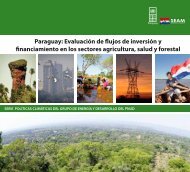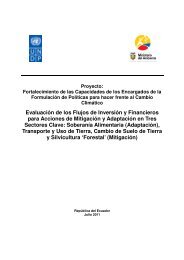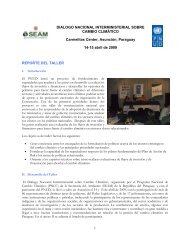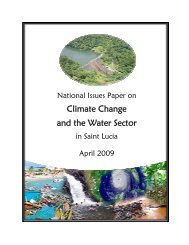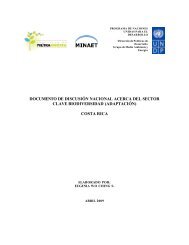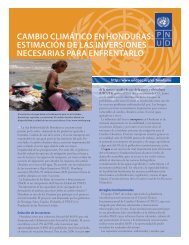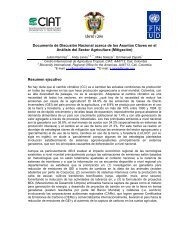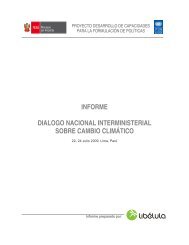View Publication - UNDPCC.org
View Publication - UNDPCC.org
View Publication - UNDPCC.org
Create successful ePaper yourself
Turn your PDF publications into a flip-book with our unique Google optimized e-Paper software.
vi<br />
Cannady — Access to Climate Change Technology by Developing Countries: A Practical Strategy<br />
FOREWORD<br />
Access to climate change technology, in particular by developing countries, is a key element<br />
of any effective international response to the global climate change challenge and one of the<br />
pillars of the United Nations Framework Convention on Climate Change (UNFCCC). In this regard,<br />
the Bali Plan of Action called for “enhanced action on technology development and transfer”.<br />
Since the Bali meeting, the role of intellectual property rights (IPRs) has been the subject<br />
of increased attention in climate change discussions on technology transfer. Different views<br />
and positions have emerged concerning how intellectual property (IP) functions to facilitate<br />
or hinder access to climate change technology. The UNFCCC negotiating texts 1 contain a wide<br />
spectrum of options and proposals relating to IP, which reflects this diversity of views.<br />
In this context, this new ICTSD paper aims to contribute to these discussions by providing a<br />
much needed practical perspective on how these options and proposals would work “in the real<br />
world” and the extent to which they would effectively enable developing countries to gain<br />
greater access to climate change technologies.<br />
The author, Cynthia Cannady, is founder of IP*SEVA, a law firm specializing in representation of<br />
sustainable energy technology ventures, and has extensive experience in technology licensing<br />
in addition to international policy work, as former director of the Intellectual Property and New<br />
Technologies Division at the World Intellectual Property Organization (WIPO).<br />
The paper critically examines various approaches that have been suggested for achieving greater<br />
access to climate change technology by developing countries, including compulsory licensing,<br />
patent pools, patent databases and structured voluntary licensing “mechanisms”. The author<br />
details the practical problems facing these approaches to achieve the expected results for<br />
developing countries.<br />
Instead, the author argues for a practical two-pronged strategy. The first prong is climate<br />
change technology innovation strategy (CCTIS), focusing on supporting climate change research<br />
and innovation in developing countries by developing country scientists. The second prong of<br />
the strategy is “win–win” development collaboration agreements for climate change technology<br />
between developed and developing country parties. Cannady’s approach emphasizes that the<br />
first prong – innovation strategy – is the foundation that makes the second prong – mutually<br />
beneficial technological collaboration – possible.<br />
Finally, the paper reflects on the UNFCCC draft recommendations for “Enhanced Action on<br />
Technology Transfer”. It emphasizes the fact that important recommendations on funding, incentives<br />
and development collaboration need to be detailed and made concrete. The author urges negotiators<br />
to recognize the need to support developing country universities and research institutions in any<br />
future agreement.<br />
The points made in the paper are likely to be thought-provoking for both those, who believe,<br />
in the author’s words, that “the notion that enforcement of IP laws per se promotes innovation<br />
(the favoured myth of developed countries), or that technology transfer can occur in a one-way<br />
flow of assets (the favoured myth of developing countries)”.<br />
More generally, the paper is an invitation to think critically about the issues raised in climate<br />
change discussions on technology transfer and IP and to consider the concrete implications of<br />
some of the proposals that are advanced in these discussions.




